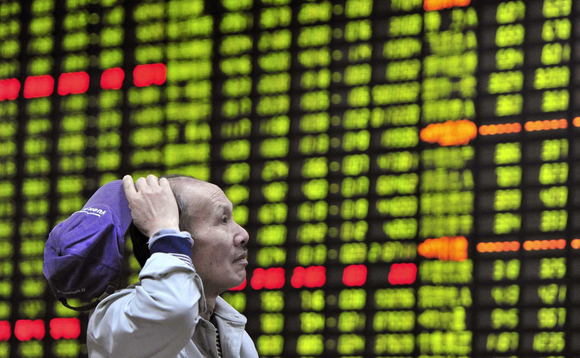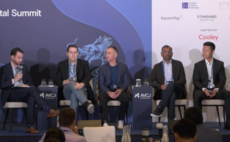
Portfolio: Morgan Stanley Private Equity Asia and AMTD

Hong Kong-based financial advisor AMTD wants to meet the needs of mainland investors looking to access international markets. Morgan Stanley Private Equity Asia is helping the firm best position itself
The manic selling of Chinese stocks on "Black Monday" sparked contagion around the world, and Hong Kong was no exception. Having gained 21% between January and the end of April, the Hang Seng Index (HSI) closed down 9.5% for the year on August 24. China's immature equity markets, ever prone to volatility, can be unforgiving.
The delicate upturn that became a surge in both the HSI and its Shanghai counterpart can be traced back to mid-March. While the latter's trajectory is steep but relatively steady, peaking in the second week of June, the former shot up 11% in the space of seven trading days in early April. It wasn't until the end of June that these gains began to be substantially pared, culminating in the recent, heavy fall back.
The HSI's rapid ascent was prompted by a spike in share purchases by mainlanders taking advantage of the Stock Connect program that enables investors in Hong Kong and Shanghai to trade in each other's markets. Overall turnover reached a record high of HK$252.4 billion ($32.6 billion) on April 8 as investors consumed the entire RMB10.5 billion ($1.64 billion) daily quota for the program.
This underlines the long-term appetite for international diversification in China. With the launch of a mutual recognition scheme in July that allows direct distribution of funds to retail investors in Hong Kong and the mainland, and a Stock Connect program between Hong Kong and Shenzhen in the pipeline, there are an increasing number of ways in which the appetite can be met.
"Chinese individuals want to diversify their wealth," says Kingsley Chan, a managing director with Morgan Stanley Private Equity Asia (MSPEA). "This is a market that is developing rapidly and we are seeing a lot of groups - corporates and financial institutions - trying to establish a presence in Hong Kong as the most logical offshore wealth management center."
When MSPEA acquired a majority interest in AMTD last year, asset management was central to the investment thesis. Hong Kong-based AMTD established itself as an independent financial advisor (IFA) and then branched into insurance broking, but investment services for mainland high net worth individuals (HNWIs) is seen as the company's future.
"In the next 5-10 years asset management will take off in Greater China," says Alan Tsang, CEO of AMTD. "There will be more demand from clients wanting to do global asset allocation, and the expertise and service level in China will not be enough to satisfy this demand. In our first meeting with MSPEA it was clear we shared the same vision."
Follow the money
There were 758,000 HNWIs in China with investable assets of at least $1 million or more as of year-end 2013, more than twice the number in 2008, according to the 2014 Asia-Pacific Wealth Report published by Capgemini and RBC Wealth Management. They had total assets of $3.77 trillion, up 125% from five years earlier.
The report also found that HNWIs in China have a higher level of trust in wealth managers and wealth management firms than any other jurisdiction in the region. They also expressed the strongest preference for seeking out professional financial advice. A separate study by HK IFA and Nielsen estimated that 2.4 million mainland travelers stayed at least one night in Hong Kong in 2013; 16% of them had assets of HK$5 million or more, and a large proportion came for investment purposes only.
There will be more demand from clients wanting to do global asset allocation, and the expertise and service level in China will not be enough to satisfy this demand - Alan Tsang
AMTD's sweet spot is clients with investable assets of $1-5 million. While the international private banks tend to focus on HNWIs with at least $10 million to their name, the lower tier is covered by semi-customized retail banking services provided by global commercial banks. MSPEA's Chan suggests that the market is both broad and underserved, given the growing sophistication of Chinese customers.
At the same time, it is becoming more contested, with banks, insurance companies, asset managers, and brokerages entering the space. These are domestic players that are essentially following client demand. There have been at least seven transactions in the last two years in Hong Kong's non-banking financial services space, driven by mainland companies seeking to create or enlarge an offshore footprint.
In 2015 alone, China Minsheng Banking Corporation agreed to buy brokerage and wealth management business Quam for more than HK$7.5 billion, while Everbright Securities took a majority stake in Sun Hung Kai Financial at a valuation of approximately HK$4 billion. Leading Chinese technology firms are also getting in on the act. In May, a consortium led by Jack Ma, founder of Alibaba Group, acquired 81% of Hong Kong brokerage Reorient Group, while Tencent Holdings is among the investors in online brokerage Futu5.com.
MSPEA sees AMTD's competitive edge as its unique blend of entrepreneurship and industry experience. The business was set up in 2003 by Cheung Kong Group, which wanted to leverage its wealth of consumer data in the financial services space. Tsang and his team were hired to execute this strategy from scratch, drawing on skills honed with the likes of Chase Manhattan Bank (now part of J.P. Morgan) and American Express. Prior to joining AMTD, Tsang was head of American Express in Hong Kong.
Cheung Kong, which owned 61.25% of the business, and management brought in Commonwealth Bank of Australia (CBA) as a strategic partner with a 30% stake. This was because the IFA model in Australia - which comprises tax advice, insurance and investment services - was deemed most relevant to Hong Kong. "At that time IFA in Hong was very different to what it is now," Tsang recalls. "It was about using consumer data to develop cross-selling models and find who is likely to buy what kind of product."
An evolving model
Focusing solely on IFA in Hong Kong, AMTD turned profitable within nine months of launch. Insurance broking followed and then asset management was added to the product portfolio two years ago. The three areas now make roughly equal contributions to overall income. The company, which employs around 500 people, also has a mortgage-broking and money-lending business.
Eight years after inception, AMTD's China exposure began with a data collection initiative across multiple first and second tier cities. The company is not licensed to market or sell products in the mainland so its efforts continue to be based on investor education: explaining financial planning and asset management in a Western context, and relying on prospective clients reaching out for advice when they are in Hong Kong.
"When we started the China business in 2010, 99.9% of our income was from Hong Kong, based on source of customer," Tsang says. "As of last year, income from China exceeded Hong Kong by a big margin."
CBA subsequently exited Hong Kong and sold its stake to Cheung Kong and the management team. AMTD began looking for a replacement partner that would be a good fit for a business model that was becoming more about asset management. MSPEA, for its part, has made numerous financial services investments across the region - including CreditEase in China, E.Sun Financial in Taiwan, and Landmark ITC in Korea - and was attracted to the AMTD business model.
"We have spent a lot of time and resources developing investment themes in the sector, and wealth management is an area we like a lot - it is asset light, primarily a distributor business, and it can scale," says Chan. "However, making investments in Asia is ultimately about the management team. We have known Alan for a long time and AMTD has built up a strong management team."
MSPEA was keen to take control and structure the deal as a management buyout, giving the AMTD team more operational autonomy as it developed the business. As a result, Cheung Kong swapped its majority position for a minority one. The size of the deal was not disclosed.
We have spent a lot of time and resources developing investment themes in the sector, and wealth management is an area we like a lot - it is asset light, primarily a distributor business, and it can scale - Kingsley Chan
Following the investment, the private equity firm helped AMTD arrange additional bank financing and has helped enhance its governance structure. MSPEA has also leveraged its affiliation with Morgan Stanley - one of the world's largest investment managers - to help strengthen AMTD's product range and industry best practices.
"We want to make sure we are up to world-class standards on compliance and control," says Tsang. "While the majority of the management team has a US banking background, this is an area in which the Morgan Stanley connection can support us."
To this end, AMTD has a direct point of contact within Morgan Stanley's legal and compliance department, and training is being provided to staff on risk management and compliance so they stay up to speed in an increasingly stringent regulatory environment.
On the product side, parts of Morgan Stanley's offering can now be distributed by AMTD. Specifically, the portfolio company has formed a business alliance with Morgan Stanley Huaxin Securities, the bank's China brokerage joint venture. This gives mainland clients the option of accessing Hong Kong stocks through AMTD's channels under the stock connect program.
Brand-building
While MSPEA is not yet considering an exit, a majority position in a Hong Kong financial services company at a time when many mainland strategic players want to enter the market is an enticing trade sale target. Potential buyers would want the company to continue its current strategy of developing a mainland China customer base.
This will not be realized through an aggressive nationwide roll-out, however. When AMTD first entered the market it opened offices in nine cities at once, its headcount soaring past 1,000. Unsure whether the first-tier cities would prove a fertile source of business given so many multinationals were already on the ground, the company essentially hedged its bets by covering key second-tier centers as well. The plan was to spend 24 months collecting data and establish which areas could deliver sustainable demand.
The initiative was expensive, with high rental costs in the largest cities and rapid staff turnover in a competitive market for talent. AMTD has shown consistent top-line growth - Tsang says compound annual growth has been double-digit since the company was founded - but the operating costs of the China strategy meant the bottom line was choppy. With the experiment over, and AMTD committed to a smaller number of high-value locations, the economic benefits are now being reaped.
"They have learned the best way to expand their customer pool is to work with more partners in China, whether it is local financial institutions that lack the ability to offer offshore products or simply working with immigration agents and wealth management firms that only have a local presence in China," say Chan. "This helps reduce the fixed costs and it doesn't really slow down growth."
Tsang's immediate objectives are threefold. He wants to introduce more products and services - he notes that single product solutions no longer satisfy an increasingly sophisticated client base - and deliver them online as well as offline. Most importantly, though, there is a desire to build the AMTD brand, to which end an association with an international bank does no harm at all.
"From time to time you hear stories about people trusting the wrong people and making the wrong investments," he says. "One of the key considerations is making customers understand exactly who we are, what our company background is, and who our shareholders are. Branding - and the trust and perceived security that comes with it - is the number one priority."
Latest News
Asian GPs slow implementation of ESG policies - survey
Asia-based private equity firms are assigning more dedicated resources to environment, social, and governance (ESG) programmes, but policy changes have slowed in the past 12 months, in part due to concerns raised internally and by LPs, according to a...
Singapore fintech start-up LXA gets $10m seed round
New Enterprise Associates (NEA) has led a USD 10m seed round for Singapore’s LXA, a financial technology start-up launched by a former Asia senior executive at The Blackstone Group.
India's InCred announces $60m round, claims unicorn status
Indian non-bank lender InCred Financial Services said it has received INR 5bn (USD 60m) at a valuation of at least USD 1bn from unnamed investors including “a global private equity fund.”
Insight leads $50m round for Australia's Roller
Insight Partners has led a USD 50m round for Australia’s Roller, a venue management software provider specializing in family fun parks.








